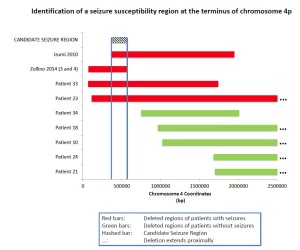Wolf-Hirschhorn syndrome (WHS) is a contiguous gene deletion syndrome involving variable size deletions of the short arm of chromosome 4. Approximately 90% of individuals with WHS have seizures. These seizures can be intractable and can seriously affect an individual’s quality of life, especially during childhood.
To study the genetic correlates of seizure susceptibility in WHS, we used a custom, high density chromosomal microarray platform designed for optimal detection of genomic changes associated with autism and neurodevelopmental disorders. By correlating the size and location of chromosome 4p deletions of forty-eight individuals with WHS with their seizure phenotypes, we identified a new genetic region located at the 4p terminus for seizure susceptibility. This region includes a potential candidate gene for seizure susceptibility, PIGG.
Future studies will involve the use of new computational and statistical methods to identify more genetic correlates of WHS traits, as well as to further characterize the mechanism of seizures based on this study’s findings. Such studies aim to identify potential treatments for many of the medical issues faced by individuals with WHS. (By Dr. Karen Ho, Dr. John Carey, and Dr. Agatino Battaglia, http://jmg.bmj.com/content/early/2016/01/08/jmedgenet-2015-103626 )
